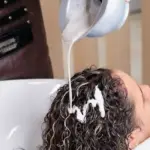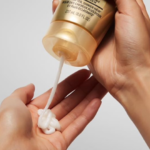Leaving Conditioner in Your Hair Overnight
Conditioning your hair is crucial for maintaining its health, softness, and manageability. But have you ever wondered if leaving conditioner in your hair overnight could be a shortcut to achieving luscious locks? As a hair care professional, I’ve explored this common practice to uncover the truth. While it might sound like a dream solution, it’s essential to understand the potential drawbacks and best practices to avoid damaging your hair.
Understanding Conditioners: What They Do for Your Hair
Conditioners are essential for maintaining the health and appearance of your hair. They work by forming a protective shield around each hair strand, locking in moisture, reducing frizz, and making your hair more manageable. Conditioners come in various forms, each tailored to specific hair needs:
- Leave-In Conditioners: Applied and left in the hair, ideal for brittle or dry hair.
- Deep Conditioners/Hair Masks: Penetrate deeply into the hair shaft to repair and nourish damaged strands.
- Regular Conditioners: Used after shampooing to provide moisture and shine, making hair easier to detangle and style.
Can You Leave Conditioner in Your Hair Overnight?
While the idea of waking up with beautifully conditioned hair is appealing, leaving conditioner in your hair overnight can lead to several undesirable outcomes. Let’s explore the risks involved:
1. Product Buildup
- Risk: Leaving conditioner on for extended periods can result in product buildup, especially if the conditioner contains heavy ingredients like silicones or oils. This buildup can leave your hair feeling sticky, stiff, and weighed down. It may also clog hair follicles, leading to weakened strands and potential hair loss.
- Extensive buildup can lead to issues like scalp acne and folliculitis, where clogged follicles become inflamed, potentially requiring medical treatment.
2. Scalp Irritation
- Risk: Prolonged exposure to conditioner can irritate the scalp, leading to itching, redness, and discomfort. This is particularly true for those with sensitive skin or conditions like dandruff or seborrheic dermatitis.
- Point: Dermatologists often advise against leaving rinse-out products on the scalp, as they are not designed for extended contact with skin, unlike leave-in treatments that are formulated for long-term use.
3. Grimy Residue
- Risk: Conditioners contain various chemicals, including proteins and silicones, that can leave behind a grimy residue if not rinsed out properly. This residue can cause split ends, breakage, and even allergic reactions in some cases.
- Point: Over time, this residue can compromise the integrity of the hair cuticle, leading to increased porosity and vulnerability to environmental damage.
Best Practices for Using Conditioner
To get the most out of your conditioner without risking damage, follow these professional guidelines:
- Use Conditioner Correctly:
- After shampooing, apply conditioner primarily to the midsection and ends of your hair, avoiding the scalp to prevent buildup.
- Leave the conditioner in for the recommended time, usually 2-5 minutes, then rinse thoroughly with lukewarm water.
- Frequency of Use:
- Condition after every wash or on days when you skip shampooing.
- Deep condition once every two weeks for regular maintenance or more frequently if your hair is particularly dry or damaged.
- Patch Test New Products:
- Before using a new conditioner, especially if you have sensitive skin, perform a patch test to avoid adverse reactions.
- Table: Comparing Conditioner Types and Usage Guidelines
| Conditioner Type | Intended Use | Application Frequency | Leave-In Duration | Recommended Users |
|---|---|---|---|---|
| Leave-In Conditioner | Provides extra moisture and protection | After every wash or as needed | Overnight or as per product instructions | Dry, brittle, or curly hair |
| Deep Conditioner/Hair Mask | Repairs and nourishes damaged hair | Once every 1-2 weeks | 20-30 minutes | Damaged, chemically treated hair |
| Regular Conditioner | Moisturizes and detangles | After every wash | 2-5 minutes | All hair types |
FAQs: Common Questions About Conditioner Use
- Is it OK to leave a little conditioner in your hair?
- Yes, but only with leave-in conditioners. Regular conditioners should be rinsed out to avoid buildup and irritation.
- What happens if you don’t rinse out conditioner?
- It can lead to product buildup, greasy hair, scalp irritation, and difficulty in styling.
- Is leave-in conditioner bad for your hair?
- No, as long as it’s used correctly. Leave-in conditioners are designed to be left in the hair and provide extended moisture and protection.
Summary
In conclusion, while the idea of leaving conditioner in your hair overnight might seem like a quick fix for dry or damaged hair, it’s generally not recommended unless you’re using a product specifically designed for that purpose. To keep your hair healthy and avoid potential pitfalls like buildup, irritation, and residue, stick to recommended usage guidelines. By following these best practices, you can ensure that your hair remains strong, shiny, and beautiful.
Check Recent Posts:
- All-in-One Insurance Package: Comprehensive Coverage for Car, Health, and Family
- Top Benefits of Car Insurance for a New Car Owner 🚗
- What Does Conditioner Do for Curly Hair?

- How to Use Leave-in Conditioner for Curly Hair: A Step-by-Step Guide

- How to Brush Curly Hair the Right Way? Tips and Techniques

- The Truth About Leaving Conditioner in Your Hair Overnight: Pros, Cons, and Best Practices

